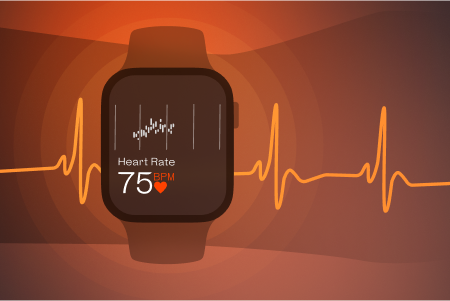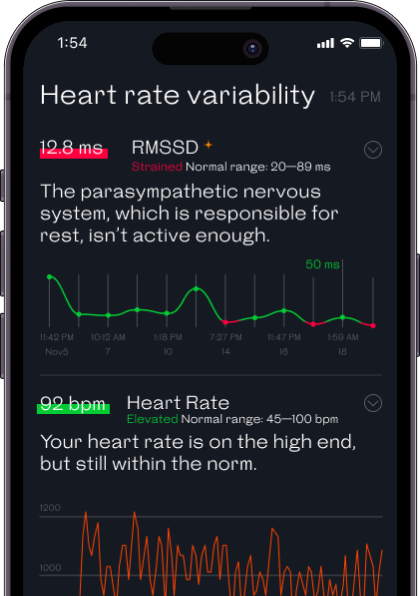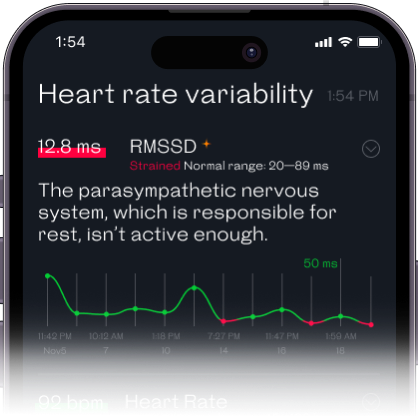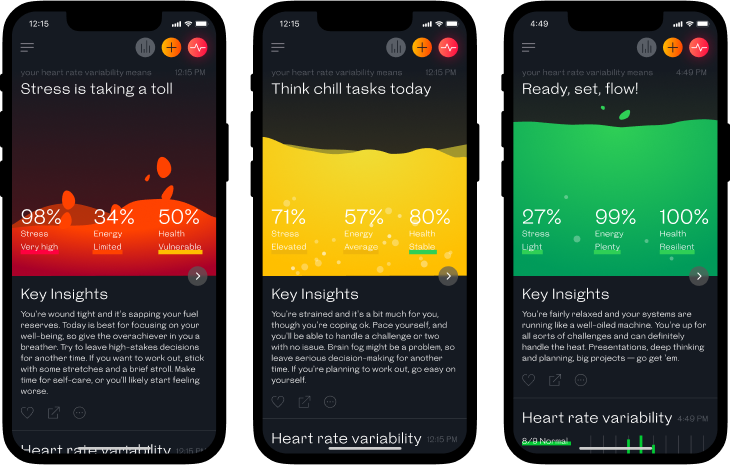


Welltory — All-in-One Wellness App.




Home » Stress & Energy » Stress and HRV

Stress is a common experience that can affect our overall health and well-being. It can cause physical, mental, and emotional problems, ranging from fatigue, anxiety, depression, and sleep disorders.
One of the ways to measure stress is through heart rate variability (HRV). HRV measures the variation in time between each heartbeat, which can provide insight into the autonomic nervous system’s functioning. Welltory, a wellness app, offers a user-friendly way to monitor HRV and manage stress levels. In this article, we will explore how stress and HRV are connected and the potential solutions to manage stress and improve HRV.
Stress can affect the body’s physiological systems, particularly the autonomic nervous system (ANS). The ANS regulates the body’s automatic processes such as breathing, heart rate, and digestion. It has two branches: the sympathetic nervous system (SNS) and the parasympathetic nervous system (PNS). The SNS is responsible for the “fight or flight” response, which prepares the body to deal with a perceived threat.
The PNS, on the other hand, is responsible for the “rest and digest” response, which promotes relaxation and recovery. The ANS constantly adjusts these responses to maintain balance or homeostasis in the body. Stress can shift the ANS balance towards the SNS, leading to a decrease in HRV.
Get Welltory
to track HRV
Get Welltory
to track HRV



Several studies have demonstrated the link between chronic stress, decreased HRV, and increased risk of chronic diseases. For example, a study published in the Journal of the American College of Cardiology found that reduced HRV is associated with increased risk for cardiovascular disease in healthy individuals. The study suggests that HRV may be a useful tool in predicting the risk of cardiovascular disease in healthy individuals.
Another study published in the Journal of Psychosomatic Research (Liu, J. J., et al., 2018) found that decreased HRV is associated with depression and anxiety in adolescents. Maintaining a healthy HRV may be a good way to prevent chronic diseases and mental health problems. We at Welltory, however, urge you to first and foremost consult your doctor if you feel like you are under excessive stress.
There are several mechanisms by which chronic stress can decrease HRV. One way is through changes in the autonomic nervous system. The sympathetic nervous system, which is responsible for the “fight or flight” response, becomes more dominant during times of stress, leading to an increase in heart rate and a decrease in HRV. The parasympathetic nervous system, which is responsible for the “rest and digest” response, becomes less active during times of stress, leading to a further decrease in HRV.
Another way that chronic stress can decrease HRV is through changes in the hypothalamic-pituitary-adrenal (HPA) axis. The HPA axis is a complex system that regulates the body’s response to stress. When the body is under stress, the hypothalamus releases corticotropin-releasing hormone (CRH), which triggers the release of adrenocorticotropic hormone (ACTH) from the pituitary gland.
ACTH, in turn, stimulates the release of cortisol from the adrenal glands. Cortisol is a stress hormone that helps the body respond to stress by increasing heart rate, blood pressure, and blood sugar levels. However, chronic stress can lead to dysregulation of the HPA axis, resulting in chronically elevated cortisol levels. This can have negative effects on the body, including decreasing HRV.
Managing stress and improving HRV can be challenging, but with the right tools, it’s possible to achieve better health outcomes. This is where Welltory comes in – as an app that provides you with real-time data on your HRV and stress levels, Welltory can help identify stress triggers and provide personalized recommendations for managing stress.
By tracking HRV over time, Welltory can help you understand how different stressors impact your body, and provide insight into how to improve heart rate variability through techniques such as meditation, breathing exercises, and physical activity.

The effects of different types of stress on HRV can vary depending on the nature of the stressor. In general, acute stressors that are brief and intense, such as a sudden loud noise or a close call while driving, can lead to an increase in HRV, while chronic stressors that are ongoing and long-term, such as a difficult work environment or a strained relationship, can lead to a decrease in HRV.
One possible explanation for this difference is that acute stressors trigger the sympathetic nervous system and the release of adrenaline, which can cause an initial increase in HRV. However, if the stressor persists, the body may switch to a state of sustained sympathetic activation, which can lead to a decrease in HRV. This is because chronic sympathetic activation can lead to changes in the heart’s electrical activity, which can affect HRV.
Research has also shown that different types of chronic stressors can have varying effects on HRV. For example, a study published in the Journal of Psychosomatic Medicine found that work-related stress was associated with lower HRV in male participants, while stress related to family conflicts was associated with lower HRV in female participants. This suggests that the impact of chronic stress on HRV may be influenced by factors such as gender, personality, and the nature of the stressor.
Another factor that may influence the relationship between stress and HRV is the individual’s level of perceived stress. Perceived stress is the subjective experience of stress and can be influenced by a variety of factors such as personality, coping strategies, and social support. Research has shown that individuals who perceive their stress as more intense or overwhelming may be more likely to experience a decrease in HRV, even in response to acute stressors.
Overall, the connection between stress and HRV is complex and multifaceted. Chronic stress can have negative effects on the autonomic nervous system and the HPA axis, leading to decreased HRV and increased risk of chronic diseases. It is important to manage stress and maintain a healthy HRV to prevent chronic diseases and mental health problems. Techniques such as meditation, deep breathing, and yoga have been shown to be effective in reducing stress and improving HRV. Get Welltory app to measure your HRV and stress levels and get actionable insights into how you can reduce stress and improve your overall well-being.
Welltory Team, 23 Feb. 2023
 App Store
App Store
 Google Play
Google Play
 Huawei AppGallery
Huawei AppGallery
 Galaxy Store
Galaxy Store

